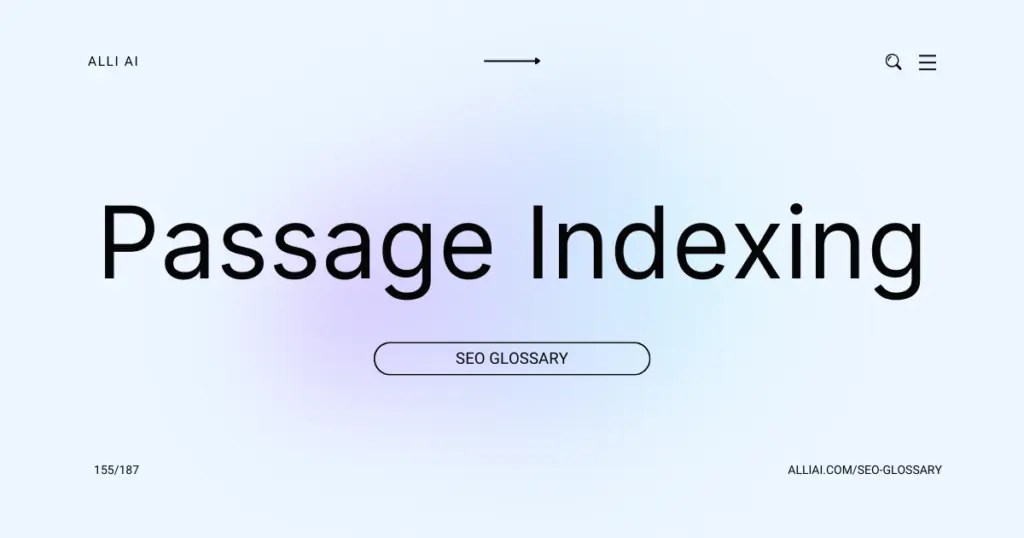What Does Passage Indexing Mean?
Passage indexing is a feature used by search engines to improve the understanding of specific sections or passages within a web page. This allows the search engine to directly index and retrieve these passages in response to a query. This is especially helpful when a page covers multiple topics, as it enables the search engine to focus on the part of the page most relevant to a user’s query, even if it’s not the main subject of the page.
Where Does Passage Indexing Fit Into The Broader SEO Landscape?
Passage indexing, introduced by Google, enables the search engine to understand and rank specific passages from a webpage, rather than just the overarching page content. This is particularly significant in SEO as it allows for the indexing and ranking of specific sections of content that are particularly relevant to a user’s query, even if the rest of the page covers a different topic.
In the broader SEO landscape, passage indexing enhances the ability to surface relevant information on more detailed queries, improving the matching of long-tail queries with precise answers. It encourages a deeper focus on creating quality content throughout a page, as any section can potentially rank independently of the page’s main theme. This feature promotes the optimization of individual sections of content, anchoring text optimization, clear headings, and a well-structured layout to boost the visibility of specific passages. Additionally, it provides an opportunity for pages with comprehensive content on multiple topics to gain visibility for more of their content, increasing the opportunities for driving organic traffic based on a wider array of search queries.
Real Life Analogies or Metaphors to Explain Passage Indexing
Imagine a large cookbook that contains thousands of recipes. Passage indexing is like a clever index at the back of the book that doesn’t just tell you on which page to find chocolate cake, but also points you to individual paragraphs where “sugar substitutes in baking” or “gluten-free flour tips” are mentioned. This allows you to quickly find specific tips or instructions without needing to read through entire recipes that may not be relevant to your immediate needs.
Passage indexing is like a librarian with a photographic memory who, instead of shelving entire books by general topics, remembers and can instantly retrieve every single passage inside those books. If you ask for something specific, like “the role of knights in medieval society,” she can guide you straight to a paragraph in a history book, even if the whole book isn’t focused solely on knights.
How the Passage Indexing Functions or is Implemented?
1. Content Analysis: Google’s system uses natural language processing (NLP) techniques to understand and analyze the content of a webpage. It breaks down the text into logical sections or passages.
2. Identification of Passages: The algorithm identifies distinct passages in a webpage’s text that could individually answer a user query. This identification is based on the relevance of sections and their contextual independence within the overall document.
3. Ranking of Passages: Once identified, passages are evaluated on how well they address potential search queries. This evaluation is likely based on factors such as the presence of keywords, the semantic relevance to the query, and the passage’s contextual information within the page.
4. Indexing: Unlike traditional indexing, where a whole page is indexed based on its overall subject and content, passage indexing treats these identified passages as mini-documents. This indexing allows these sections to be independently retrievable from the main page in response to specific queries.
5. Retrieval in Search Results: During a search query, the algorithm compares the user’s query against its index of passages. If a passage from any page is deemed a close match to the query, it can be displayed in search results, potentially with a higher ranking, even if the rest of the document is less relevant to the query.
6. Display: Selected passages are displayed in search results, often with a snippet highlighting the section of text that is most relevant to the query, guiding users directly to the portion of the content that addresses their question or need.
This process allows Google to surface specific, relevant content that might otherwise be buried in long-form, comprehensive articles, improving the precision of search results and enhancing user satisfaction.
Impact Passage Indexing has on SEO
Passage Indexing allows Google to index specific passages from a webpage, rather than just the page as a whole. This can significantly impact SEO performance and rankings by allowing pages that cover multiple topics to rank for specific, relevant queries, even if those topics are only a small part of the page. This means that more nuanced or detailed content within a page can be surfaced in search results, enhancing the visibility of webpages. For user experience, Passage Indexing helps by delivering more precise answers to specific queries, which can improve content discoverability and satisfaction as users find the exact information they need more efficiently.
SEO Best Practices For Passage Indexing
1. Break your content into well-defined sections with clear headings and subheadings that summarize the topic or question being addressed in each section.
2. Use structured data to help search engines better understand and categorize the page content. Implement schema markup like FAQPage, Article, or QAPage where applicable.
3. Keep your paragraphs short, ideally 2-3 sentences long, focusing each on a single idea or concept to help search engines easily extract and index passages.
4. Utilize natural language and clear, direct wording. Avoid jargon and overly complex language that might confuse both readers and search engines.
5. Place important content higher up on the page, as search engines tend to attribute more value to content at the beginning of a document.
6. Optimize your content for relevant keywords but ensure they are inserted naturally within the context of the text. Keywords should reflect the specific queries a user might type into a search engine.
7. Improve the webpage loading speed since page performance can affect the indexing and user experience.
8. Ensure your website is mobile-friendly, as many users access the web through mobile devices and Google predominantly uses mobile-first indexing.
9. Regularly update the content to keep it current and relevant, as freshness can be a factor in how passages are indexed and served in search results.
10. Use internal linking to help search engines discover and understand the context and relationships between different passages and pages on your site.
Common Mistakes To Avoid
1. Ignoring Long-Form Content: Solely focusing on short, succinct content might cause you to miss opportunities where long-form content could be more effective, especially in leveraging passage indexing. Creating comprehensive, in-depth articles improves the probability of individual passages being indexed and ranked.
2. Failing to Use Clear Subheadings: Without clear, descriptive subheadings, search engines may struggle to identify the specific focus of each passage within your content. Ensure subheadings are reflective of the content in each section and utilize relevant keywords.
3. Over-Optimization of Keywords: While it’s important to include relevant keywords, over-optimization can lead to penalties or reduced effectiveness in passage indexing. Strive for a natural integration of keywords that doesn’t disrupt readability or the flow of content.
4. Neglecting Structured Data: Not implementing structured data, such as schema markup, can result in missed opportunities to enhance search engine understanding and context of page content, which is crucial for optimizing passage indexing.
5. Poor Content Segmentation: If passages within the content are not distinct or logically separated, search engines might find it difficult to identify and index relevant sections accurately. Ensure content is well-organized and logically divided.
6. Skipping Content Freshness: Outdated content may not be as competitive or relevant for current search queries. Regularly update and refresh content to ensure it remains relevant and effective for passage indexing.
7. Ignoring User Intent: Content that fails to address the user’s intent can lead to poor engagement and reduced relevance, which negatively impacts how passages are indexed and ranked. Tailor content to meet the specific needs and questions of your audience.
8. Inadequate Internal Linking: Not using internal linking effectively can prevent search engines from understanding the context and relevance of different passages within your broader site content. Use internal links to connect relevant topics and guide search engines and users through your site.
9. Content Depth and Quality: Superficial content that lacks depth or is of low quality may not be indexed favorably by search engines. Focus on providing valuable, well-researched information that satisfies search queries thoroughly.
10. Mobile Optimization Neglect: Given that passage indexing applies to all platforms, not optimizing content for mobile users can lead to poor user experiences and potentially impact how passages are indexed. Ensure content is accessible and readable on mobile devices.
By avoiding these pitfalls and focusing on effective SEO practices, you can better leverage passage indexing to improve your content’s visibility and ranking in search engine results.





